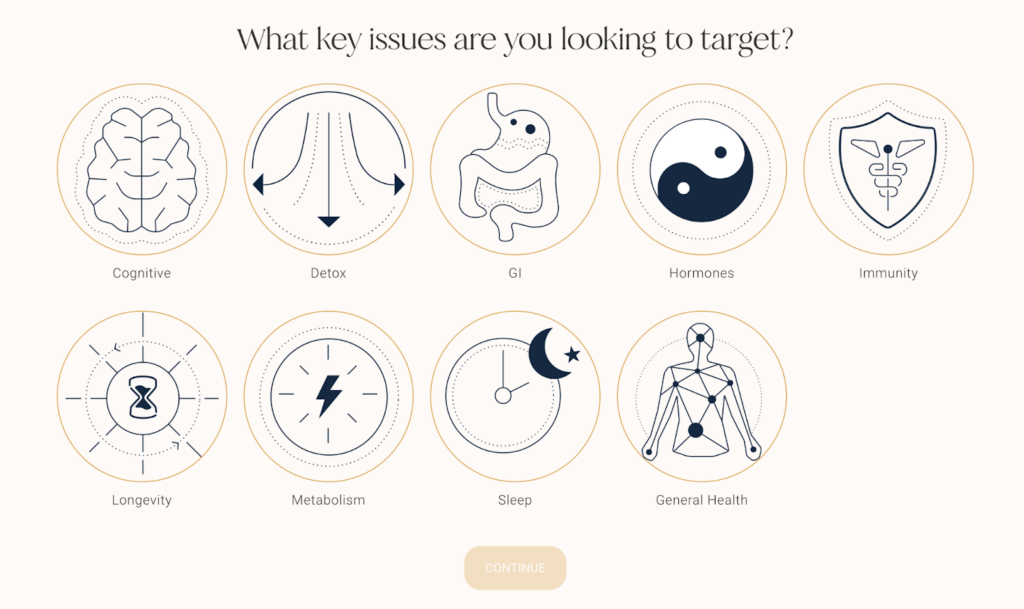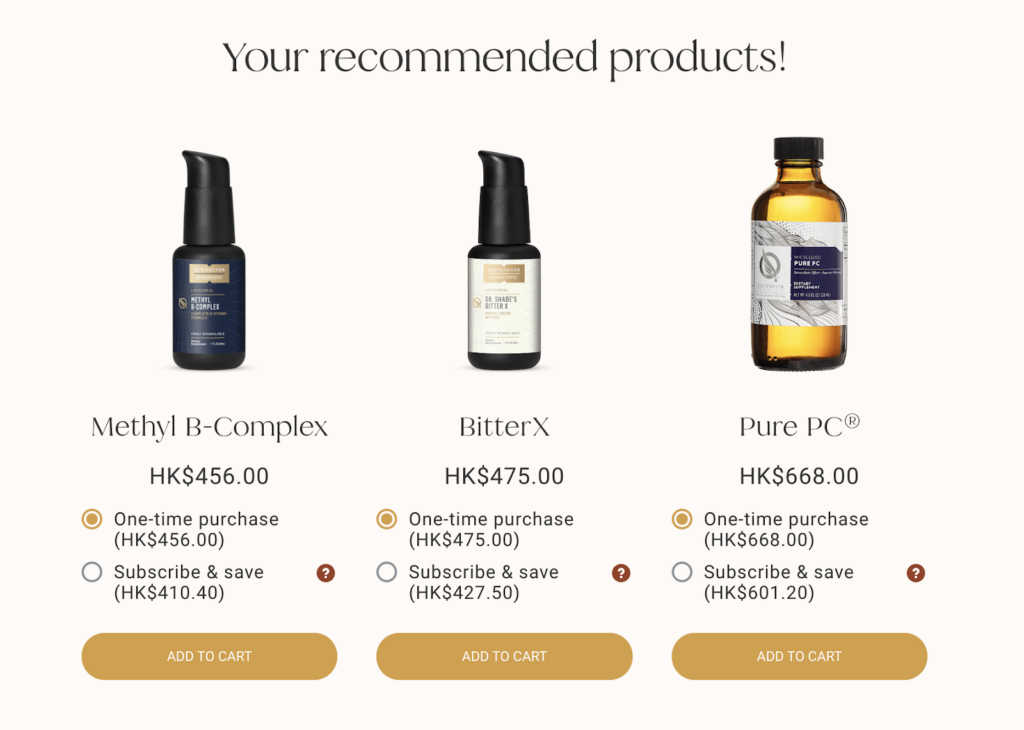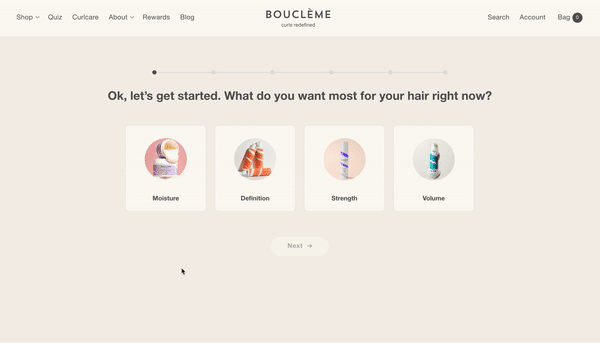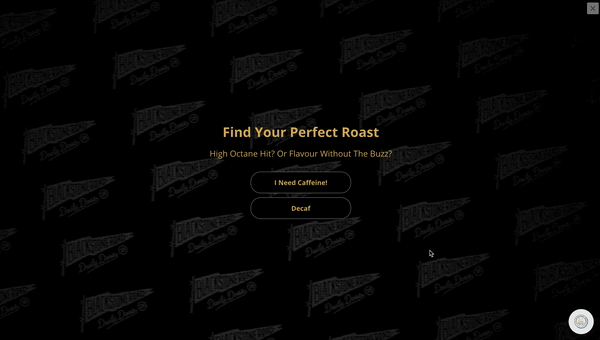Is a Product Recommendation Quiz the Answer for Your Ecommerce Site?
The correct application of a product recommendation quiz can increase sales, conversion rates and trust with customers. However, it can require a significant investment of time and resources. Learn more about the nuances of this tool, and some of our top tips, from Gregg Forbes, Project Manager at Swanky.
Written By
Gregg Forbes

When it comes to connecting consumers with the most relevant product(s) for their needs, there are many tools and strategies at your disposal as an ecommerce retailer. In this article though, we will look at just one: the product recommendation quiz.
In short, an ecommerce quiz streamlines the user journey by helping shoppers quickly and easily identify the most suitable product(s) from your catalogue. It asks your store visitors a series of questions to assess their needs, analyses their responses and then presents recommendations for the most relevant products. A product recommendation quiz is a fun and interactive tool that can improve the customer experience, increase conversion rate and provide rich customer insights.
However, these quizzes aren’t a one-size-fits-all answer to the question of how to engage and guide new users to an appropriate product. Here, we’ll look at the pros and cons of quizzes and share some examples of how our clients have successfully leveraged their application.
Why is a product recommendation quiz useful?
Whilst we have touched on the advantages of product recommendation quizzes above, there is much more to be said for the benefits they provide retailers and customers alike.
As well as being a fun way to introduce customers to your product catalogue and streamline the route to purchase, ecommerce quizzes are useful because they prove a valuable source of zero-party data. This is data intentionally shared by a customer with a company, which can be used to provide personalised interactions later on in the customer journey.
For instance, you can store a customer’s quiz answers in their customer profile and use it to tailor any post-purchase emails you send them, or to determine which homepage content they are presented with on their next visit. These types of interactions increase a customer’s affinity with a brand and lead to higher levels of audience engagement.
Zero-party data is increasingly valuable because third-party data is becoming less available through cookies; a trend that is set to continue for the foreseeable future.
Product recommendation quizzes are also useful because they:
- offer a chance to educate your customer on your product and brand;
- provide a guided experience for customers;
- grow your email list;
- generate new leads; and
- cultivate those leads into potential sales
All in all, they help move customers down the marketing funnel towards the point of purchase. They are especially useful if you have a large number of SKUs, or if you have very similar products that can be difficult to distinguish from each other.
Is a product recommendation quiz worth your investment?
For all their benefits, quizzes aren’t the only way to gain zero-party data or achieve the things listed above. The main drawback to quizzes is that they often require a significant investment of time to create. And this investment of time is not guaranteed to provide sales.
An example that demonstrates the level of investment required for a quiz comes from a recent client of ours. This client’s product offering was especially niche and so they sought to utilise a quiz to educate customers and provide comprehensive product recommendations.
Combining the brand’s extensive product catalogue with the variety of product recommendations the quiz needed to give, led to a huge build process. The result was a quiz containing 739 custom configurations that were manually created so as to provide suitable product recommendations for each possible answer path. The more questions and answers you add, the more routes there are through that quiz. Each one needs an associated recommendation, and therefore takes time to both set up and manage.
There are plenty of examples detailing the success that quizzes can provide, primarily because of the valuable data they give. However, a brand’s growth isn’t defined by how much data they have, but rather its profit. Without a guaranteed Return on Investment (ROI), only you can decide whether this tool is worth the necessary input of time and resources.
Our tips for a great ecommerce quiz
If a quiz is the right fit for your store, here are some of our top tips to keep in mind:
Keep it short and unique
A quiz is designed to keep users on your store by helping them find the product they need. However, if your quiz is too long or complex, you will likely witness a high drop-off rate. This is the exact opposite of your desired outcome.
We suggest starting small and then testing changes and additions to see the value of the quiz for your store. This is the most economic way to understand the ROI of your quiz.
Tied in with this is the idea of creating a unique tool. Users are familiar with ecommerce tools such as quizzes, so keeping your quiz unique is vital to keep users engaged. This could be achieved a number of ways, be it the way it’s designed or the offer given at the end. Whatever makes it unique, ensure it’s also in keeping with your brand identity.
Communicate clearly
Clear communication is an essential part of an ecommerce quiz. Customers want to know precisely what they are doing and why they are doing it. Therefore, clearly communicating what a quiz entails and why it is beneficial is vital because it builds trust and therefore leads to more, high-quality data.
End the quiz with a Call to Action (CTA)
Customers will complete a quiz on your site if there is something they stand to gain. This is commonly a discount code, free gift or loyalty points. No matter what it is, ensure it’s communicated clearly from the start and shared when the quiz is completed.
Get product recommendations right
Data suggests that giving 2-4 product recommendations is usually the sweet spot for an ecommerce quiz.1 It strikes the balance between giving enough options and showcasing your available products, without overwhelming a customer with options.
Quiz examples from Swanky clients
Not only do these examples highlight brands in different industries successfully leveraging a product recommendation quiz, they further showcase the varied use cases of this ecommerce tool.
Bonasana: Navigating a large product offering
This health and wellness brand based in Hong Kong owns a complex and broad product catalogue; one that new customers may find challenging to navigate without guidance. As a result, the brand chose to use a quiz to help users easily find the right product for their needs.
We recommended that Bonasana introduce Octane AI to its tech stack to power this quiz. After capturing information about a customer’s age and sex, the quiz then guides a user through questions regarding the issues they want to treat and their symptoms.

Advanced logic uses these answers to provide appropriate product recommendations.

You can learn more about the other apps we recommended in this case study about Bonasana’s new Shopify tech stack.
Bouclème: Empowering customers with product recommendations
Bouclème is a European haircare brand focused on helping ‘set curls free’. The brand is passionate about empowering customers with advice and solutions for curly hair. Many curly-haired people are unsure how to best manage their curl type. Given this, a quiz was a great tool for them to educate and guide customers. Moreover, it allowed Bouclème to seamlessly connect users with appropriate products, thus increasing conversion rate.
The quiz, powered by QuizKit, asks shoppers questions about their hair goals, curl type, scalp condition and treatment history.

This product recommendation quiz was complemented by other product discovery aids commonly found on beauty and cosmetics websites, such as a needs-based navigation menu and a bespoke ‘Complete the routine’ section on product pages. Learn more in this case study about our design and development work for Bouclème.
Blackstone Road: Delivering an in-store recommendation experience online
Blackstone Road is an Australian coffee brand that leveraged Swanky’s experience of ecommerce food and beverage stores to launch a shiny new Shopify website.
Coffee is a personal preference product and so, to ensure customers found their perfect roast, a product recommendation quiz, powered by Octane AI, was included in the store’s tech stack. The application of a quiz helps deliver a tailored recommendation experience online, akin to that of chatting with a barista at a café about your preferences and having a particular product recommended.
This quiz quickly established itself as the brand’s most powerful selling tool. Sean Fisher, Founder of Blackstone Road, noted:
“So far, more than 50% of sales have been associated with the quiz. It’s mind-blowing! When you have products that are so heavily influenced by individual taste and have multiple options available, it’s a no-brainer to go with a quiz.”

Learn more about this project in our Blackstone Road case study.
Expert Shopify tech stack recommendations
Swanky is a team of Shopify Plus experts with decades of collective experience. This expertise has been applied to countless projects, creating market-leading ecommerce solutions that convert customers and grow brands.
One way we do this is through ecommerce tech stack consultancy and app recommendations. We combine our extensive knowledge of Shopify’s app ecosystem with an in-depth understanding of your business’ needs to recommend apps that will improve the customer experience, increase efficiencies and power growth. This might include suggestions for a product recommendation quiz tool, a reviews platform, or on-site search functionality.
If you want to hear more about how we can support your ecommerce brand with our expert tech stack consultancy, get in touch today.
For reference:
[1] https://faculty.washington.edu/jdb/345/345%20Articles/Iyengar%20%26%20Lepper%20(2000).pdf

